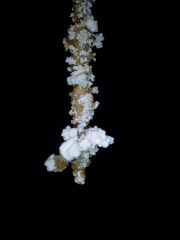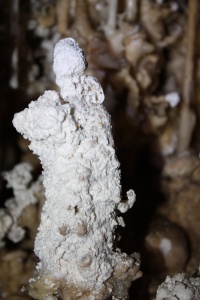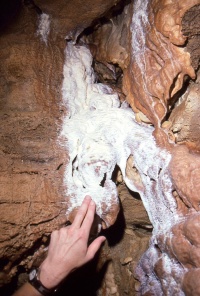Hydromagnesite (Inventory)/Moonmilk
From LagWiki
(Links) |
(Move the gallery) |
||
| (10 intermediate revisions not shown) | |||
| Line 1: | Line 1: | ||
| + | {{Inventory image|File:Moonmilk.JPG|Moonmilk on soda straw}} | ||
The '''Moonmilk''' field of the [[Hydromagnesite (Inventory)|Hydromagnesite]] section should be used to record any observation of moonmilk no matter its mineral content which may be hard to determine in the field anyway. | The '''Moonmilk''' field of the [[Hydromagnesite (Inventory)|Hydromagnesite]] section should be used to record any observation of moonmilk no matter its mineral content which may be hard to determine in the field anyway. | ||
| - | Moonmilk is a soft, white, pasty deposit. The texture is often described as having the consistency of cottage cheese. Small particles in the deposit account for the smooth texture. It can range from liquid to a dry powder depending upon the environment. The mineral content of moonmilk can be hydromagnesite, dolomite, huntite, [[Calcite (Inventory)|calcite]], [[Aragonite (Inventory)|aragonite]], or a variety of other minerals. It is most commonly found near the intersection of the [[Bedrock (Inventory)/Massive|massive reef]] with either the [[Bedrock (Inventory)/Forereef|forereef]] or [[Bedrock (Inventory)/Backreef|backreef]]. | + | Moonmilk is a soft, white, pasty deposit. The texture is often described as having the consistency of cottage cheese. Small particles in the deposit account for the smooth texture. It can range from liquid to a dry powder depending upon the environment. The [[Hydromagnesite (Inventory)/Powder|powder form]] is inventoried in a different field. |
| + | |||
| + | The mineral content of moonmilk can be hydromagnesite, dolomite, huntite, [[Calcite (Inventory)|calcite]], [[Aragonite (Inventory)|aragonite]], or a variety of other minerals. It is most commonly found near the intersection of the [[Bedrock (Inventory)/Massive|massive reef]] with either the [[Bedrock (Inventory)/Forereef|forereef]] or [[Bedrock (Inventory)/Backreef|backreef]]. Moonmilk deposits can appear anywhere and on anything including other formations. | ||
| + | |||
| + | ==See also== | ||
| + | *[[Hydromagnesite (Inventory)/Powder|Hydromagnesite powder]] | ||
==References== | ==References== | ||
| - | *Burgess, Harry. ''Canyons & Caves; Issue No. 3; Fall 1996 | + | *Burgess, Harry. ''Canyons & Caves; Issue No. 3; Fall 1996''; Moonmilk: http://www.nps.gov/cave/planyourvisit/upload/c&c3.pdf |
| + | |||
| + | ==Moonmilk, Hydromagnesite== | ||
| + | <gallery perrow=1 widths=200px heights=300px> | ||
| + | File:Moonmilk stalagmite.jpg|Moonmilk stalagmite | ||
| + | File:moonmilk flowstone.jpg|Moonmilk flowstone, hand for scale | ||
| + | </gallery> | ||
{{Cave inventory}} | {{Cave inventory}} | ||
| - | |||
Current revision as of 14:33, 9 August 2013
The Moonmilk field of the Hydromagnesite section should be used to record any observation of moonmilk no matter its mineral content which may be hard to determine in the field anyway.
Moonmilk is a soft, white, pasty deposit. The texture is often described as having the consistency of cottage cheese. Small particles in the deposit account for the smooth texture. It can range from liquid to a dry powder depending upon the environment. The powder form is inventoried in a different field.
The mineral content of moonmilk can be hydromagnesite, dolomite, huntite, calcite, aragonite, or a variety of other minerals. It is most commonly found near the intersection of the massive reef with either the forereef or backreef. Moonmilk deposits can appear anywhere and on anything including other formations.
See also
References
- Burgess, Harry. Canyons & Caves; Issue No. 3; Fall 1996; Moonmilk: http://www.nps.gov/cave/planyourvisit/upload/c&c3.pdf
Moonmilk, Hydromagnesite



